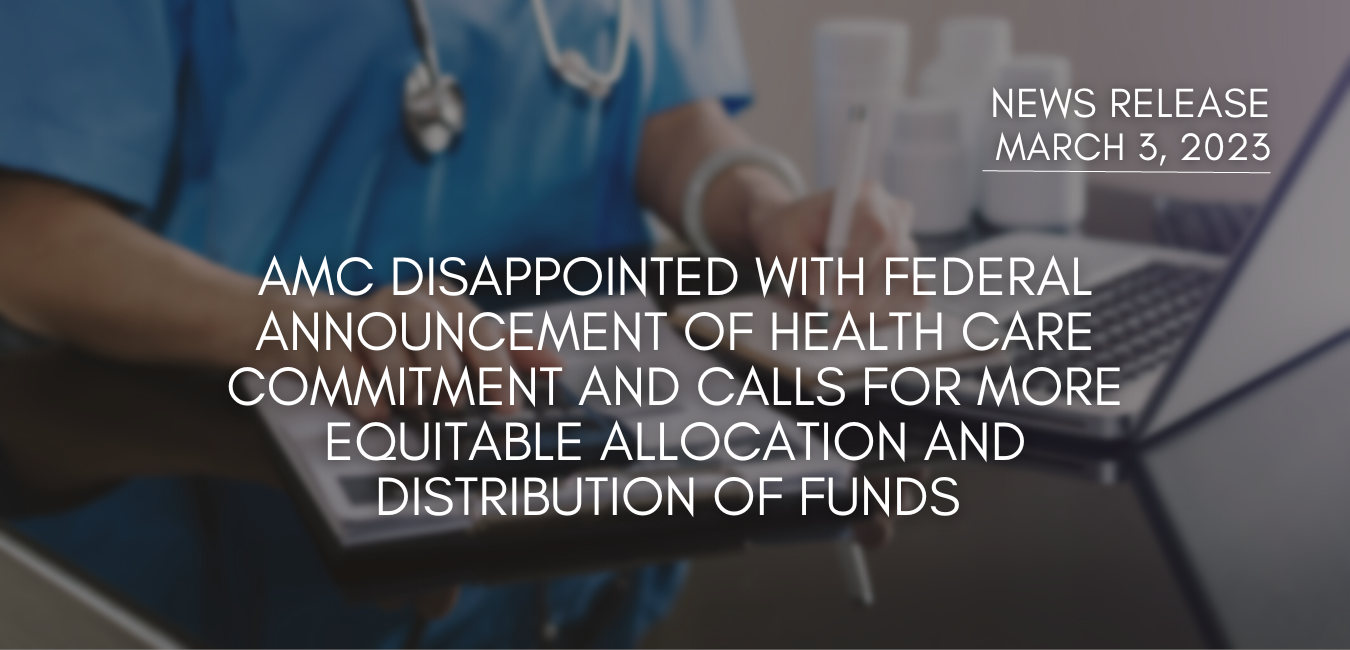AMC Disappointed with Federal Announcement of Health Care Commitment and Calls for More Equitable Allocation and Distribution of Funds

March 3, 2023
Treaty One Territory, Manitoba
AMC Communications
Treaty One Territory, MB – The Assembly of Manitoba Chiefs (AMC) acknowledges the announcement made by Prime Minister Justin Trudeau on the commitment of a Federal Health Equity Fund of $2 billion over a 10-year time frame that will be disbursed to Indigenous peoples across Canada.
Prime Minister Justin Trudeau’s newest campaign promises to improve access to 7health care for First Nations peoples and acknowledges that the healthcare system fails First Nations. The Federal government has a moral and fiduciary responsibility to First Nations treaty right to health. The federal government has been unable to provide adequate health services to First Nations, who historically have had limited access to quality healthcare and health resources. Furthermore, the complicated Federal Non-Insured Health Benefits program continues to follow colonial policies resulting in the annual erosion of the First Nations treaty right to health.
“Although this number appears to be substantial funding, this new Health Equity Fund is a Pan-Indigenous approach with $2 billion shared between 600 First Nations, as well as shared with the Metis and Inuit peoples throughout Canada,” Grand Chief Cathy Merrick said. “On quick calculation, that $2 billion is less than $1 investment per First Nation citizen, which becomes further diluted when you consider it is shared with Metis and Inuit citizens. That is utterly shameful.”
These bureaucratic wranglings must be addressed immediately, and we, as First Nations, must be at the table to protect our rights and equity. If the government does not truly commit to addressing the systemic racism, discrimination, and inequities in health care services for First Nations citizens in Manitoba, then accessibility will worsen and sadly, cause more deaths. The AMC calls on the federal and provincial government for a seat at the table to design, develop, and implement a healthcare system for First Nations in Manitoba that ensures an equitable allocation and distribution of healthcare funds that align with the needs and wants of First Nations citizens in Manitoba.
In the 2022-23 fiscal year, the Province of Manitoba will receive $5.1 billion in funding through significant transfers from the federal government. Of this amount, $2.2 billion were in Canada Health Transfers and Canada Social Transfers, directly allocated based on population, of which $185 million in Canada Health Transfers and $65 million in Canada Social Transfers are due to First Nations citizens living on or off-reserve in Manitoba.
“We call on the provincial government to invite First Nations leadership in Manitoba in planning a strategy to allocate these funds to First Nations and ultimately design a health care system together,” said Grand Chief Cathy Merrick. “We need to eliminate the provincial government from being a middle manager for limited services. Furthermore, the federal government proposed the co-development of distinctions-based Indigenous health legislation, an initiative by Indigenous Service Canada (ISC). This legislation further perpetuates the colonial control over the First Nations treaty right to health, self-government, and sovereignty. First Nations leadership in Manitoba and the AMC do not support this exercise of dictating to First Nations.”
-30-
For more information, please contact:
Communications Team
Assembly of Manitoba Chiefs
Email: media@manitobachiefs.com
About the Assembly of Manitoba Chiefs
The AMC was formed in 1988 by the Chiefs in Manitoba to advocate on issues that commonly affect First Nations in Manitoba. AMC is an authorized representative of 62 of the 63 First Nations in Manitoba with a total of more than 151,000 First Nation citizens in the province, accounting for approximately 12 percent of the provincial population. AMC represents a diversity of Anishinaabe (Ojibway), Nehetho / Ininew (Cree), Anishininew (Ojibwe-Cree), Denesuline (Dene) and Dakota Oyate (Dakota) people.